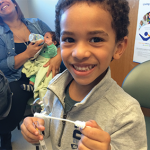 Why was this study done? Juvenile dermatomyositis (JDM) is the most common type of idiopathic inflammatory myopathy in childhood, and most patients have a chronic disease course requiring prolonged administration of systemic glucocorticoids and immunosuppressive agents. The initial management for patients with moderately severe JDM is relatively standardized, typically including methotrexate and systemic glucocorticoids with or without intravenous immunoglobulin. The next best steps in treatment, however, remain unclear. Biologic disease-modifying anti-rheumatic drugs (DMARDs) have increasingly been used off label for JDM—and for refractory disease in particular. The objective of this study was to develop consensus treatment plans for patients with refractory, moderately severe JDM treated with biologic DMARDs.
Why was this study done? Juvenile dermatomyositis (JDM) is the most common type of idiopathic inflammatory myopathy in childhood, and most patients have a chronic disease course requiring prolonged administration of systemic glucocorticoids and immunosuppressive agents. The initial management for patients with moderately severe JDM is relatively standardized, typically including methotrexate and systemic glucocorticoids with or without intravenous immunoglobulin. The next best steps in treatment, however, remain unclear. Biologic disease-modifying anti-rheumatic drugs (DMARDs) have increasingly been used off label for JDM—and for refractory disease in particular. The objective of this study was to develop consensus treatment plans for patients with refractory, moderately severe JDM treated with biologic DMARDs.
What were the study methods? The biologics work group of the Childhood Arthritis and Rheumatology Research Alliance (CARRA) JDM Research Committee used case-based surveys, consensus framework and nominal group technique to produce biologic DMARD consensus treatment plans for patients with refractory moderately severe JDM.
What were the key findings? The final survey included 76 pediatric rheumatology providers practicing in North America who treat patients with JDM. Four biologic DMARD consensus treatment plans were proposed, with different options for dosing and/or route of administration: tumor necrosis factor α (TNFα) inhibitor (i.e., adalimumab or infliximab), abatacept, rituximab and tocilizumab. Consensus was achieved for the proposed treatments, as well as for patient characteristics, concomitant medications, assessments, outcome measures and follow-up.
By weighted average, respondents indicated they would most likely administer rituximab, followed by abatacept, TNFα inhibitor and tocilizumab. Of note, Janus kinase (JAK) inhibitors, a class of small-molecule inhibitors, were deemed to be outside the scope of the present consensus treatment plan and became prominent after its development.
What were the main conclusions? The first consensus treatment plans from North America for the administration of biologic DMARDs in refractory moderately severe JDM were developed using consensus methodology.
What are the implications for patients and clinicians? The goals of these biologic DMARD consensus treatment plans are to foster greater standardization of treatment for patients with refractory JDM and, given the paucity of prospective comparative trials in this population, to facilitate future comparative effectiveness research using the CARRA registry to identify the best treatment options for these patients.
The study: Tarvin SE, Sherman MA, Kim H, et al.; Childhood Arthritis and Rheumatology Research Alliance Juvenile Dermatomyositis Workgroup. Childhood Arthritis and Rheumatology Research Alliance biologic disease-modifying antirheumatic drug consensus treatment plans for refractory moderately severe juvenile dermatomyositis. Arthritis Care Res (Hoboken). 2024 Jun 27.


